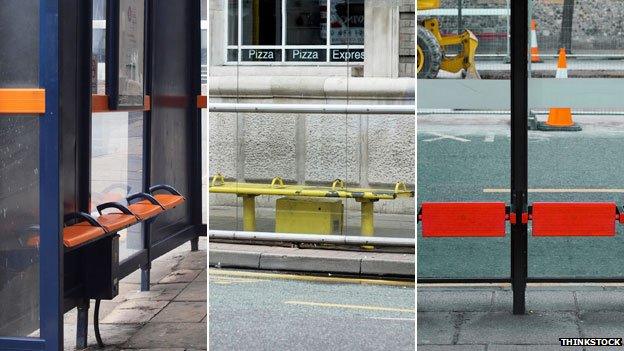The cornucopia of anti-homeless sleeping design
- Published
BBC London's Nick Beake has been gauging reaction from residents
Metal studs have been placed on the floor outside a block of luxury flats in London in an attempt to deter rough sleepers. It's provoked outrage but such measures are common, writes Justin Parkinson.
Across much of the world, the centre of cities are becoming harder places for homeless people to sleep. The latest example is the installation of a set of metal studs, external in an alcove outside a doorway to a building in Southwark, south London. The studs would prevent anyone sleeping in the alcove. Similar studs can be seen in Paris, external. And in New York, external. A Tesco in central London was criticised for having spikes, external.
It's not just strips of spikes. Look at the design of bus stop seats in the UK. They typically prevent anyone sleeping. One of the most common designs is a narrow plastic bench with a pronounced slope. A sleeper would roll off. Other designs are broken up by arm-rests. Some have become "perch boards" to make even sitting - as opposed to leaning - on them impossible.
In Honolulu in Hawaii, the authorities replaced bus station benches with round concrete stools. Pointed concrete sections of pavement have been placed around buildings in Germany. In San Francisco, managers of a civic auditorium blasted the sounds of chainsaws, motorcycles and jackhammers, external overnight to clear away the homeless. In London, shop fronts have had recesses removed. Homeless people have reported more frequent watering down with hoses in public areas.

British bus stops are designed to be hard to sleep on
Some people regard some anti-sleeping measures as not necessarily being a bad thing, external. Rough sleeping is dangerous and it is always better to accommodate people in hostels. But others think it represents an unpleasant attitude towards homeless people, comparing it to anti-pigeon measures.
"It's totally inhumane," says Paul, who slept rough in London for two years. "We are not talking about rodents here but human beings. We are going back to the dark ages for some reason. We don't seem to be a caring nation anymore. When I was homeless we used to sleep in an alleyway off the Strand. In the morning the cleaners used to move us on gently, but attitudes have hardened. The homeless people outside the block of flats weren't blocking the door and they'll probably just move on somewhere else."
Supporters of the studs say they are not painful and merely preventative. But the spikes send out a bad message, says Katharine Sacks-Jones, head of policy at Crisis. "It's like you're not treating people as people but as a problem to be got rid of. But it's really encouraging that people are angry."
Subscribe to the BBC News Magazine's email newsletter to get articles sent to your inbox.